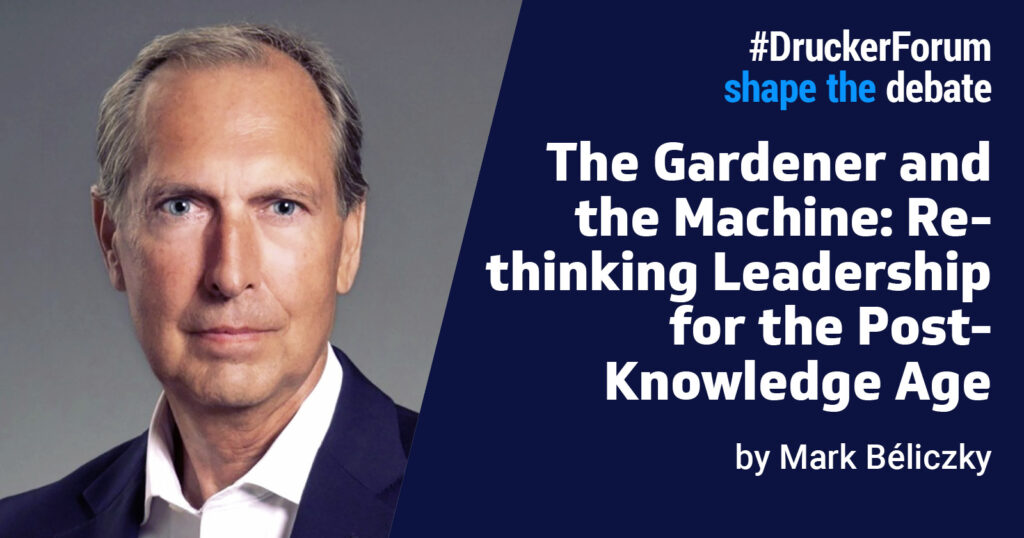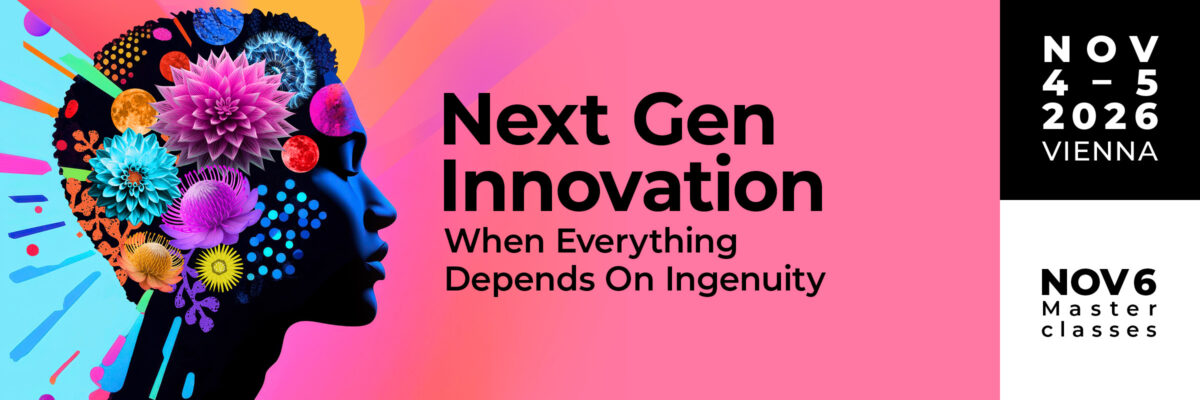
“In a world where machines can know everything, leadership is the human art of making knowledge matter.”
The Paradox of Knowing
In an age when machines can learn almost anything, the true work of leadership is learning how to cultivate what machines cannot — understanding, trust, and the conditions for human flourishing.
Artificial Intelligence has achieved what Peter Drucker once called the triumph of knowledge. It can summarize, simulate, and predict with astonishing speed — yet it cannot understand. AI holds humanity’s accumulated intelligence but not its lived wisdom.
Knowledge, Drucker reminded us, must be improved and applied through judgment — or it vanishes. Understanding must be cultivated. It grows through reflection, experience, and relationship — through what no machine can replicate: meaning.
If AI represents the triumph of knowledge, leadership represents the renewal of understanding. Leadership, at its best, transforms purpose into pattern — aligning human energy toward value that endures — value that compounds when purpose, trust, and accountability move in rhythm.
From Mechanics to Ecology
For more than a century, leaders were trained to think like engineers — to build, control, and optimize. But organizations today resemble ecosystems more than machines: interdependent, adaptive, and unpredictable.
David Hurst describes this shift as the move from the commander to the gardener. The gardener does not dictate growth; they cultivate the conditions for it. They know when to prune and when to wait, how to protect what’s fragile and regenerate what’s spent.
This ecological metaphor is more than poetry. It describes how modern organizations survive. Leadership is no longer about designing perfect systems; it is about nurturing healthy ones — balancing efficiency with adaptability, structure with emergence, and continuity with change.
The gardener-leader remains a designer — not of structures to control, but of systems that can adapt, self-correct, and sustain. Drucker anticipated this evolution when he wrote that management’s task is to make human strengths productive. In ecological terms, that means creating the soil — purpose, trust, and clarity — in which human potential can take root. In living organizations, purpose acts as sunlight — orienting growth, direction, and shared energy across the ecosystem.
The Machine and the Garden of Human Experience
AI’s brilliance tempts us to believe that intelligence can be detached from experience. But human knowing is not merely computational; it is contextual and emotional.
AI can inform, but it cannot care. It can process data, but not discern meaning. Leadership, therefore, becomes the act of re-attaching intelligence to experience — ensuring that what we know still serves what we value.
Here, value encompasses the full ecosystem that sustains enterprise — team members, customers, suppliers, communities, and society itself. Leadership’s true measure is the coherence it brings to these interdependencies.
Like the gardener who reads the weather before planting, wise leaders read the social and emotional climate before acting. They sense the timing of change, the rhythm of renewal, and the invisible patterns that connect people to purpose.
Short-term acceleration — the leadership equivalent of hot housing — may yield rapid results, but it is energy-intensive and ultimately unsustainable. Growth without balance exhausts the system that enables it.
The real risk of AI is not that it will replace leaders, but that it will seduce them into mistaking information for wisdom. Leaders everywhere now face a defining question: what does it mean to cultivate wisdom in a world of knowledge?
The Post-Knowledge Ecology
We are entering what might be called the Post-Knowledge Ecology — a world where intelligence is ambient, but understanding must still be cultivated.
In this new landscape, Drucker’s insights converge with the Lisbon Value Creation Principles:
- Customer value over short-term profit — because ecosystems survive by serving what sustains them.
- Autonomous networks over hierarchies — because resilience arises from distributed strength.
- Adaptive mindsets over static plans — because life, not logic, drives renewal.
Leadership in this ecology is measured not by control but by coherence — the capacity to align independent agents toward shared purpose. It is less about knowing the answers than about asking better questions.
The future will not reward those who tighten control, but those who design for frictionless flow — where information, trust, and creativity circulate freely through the system.
This is the leader as gardener: cultivating flow, trust, and energy across the living system.
The Feminine Turn
This ecological model of leadership rebalances energies long dominated by the impulse to control. It restores the equally vital capacity to connect, nurture, and sustain — qualities often described as feminine, but better understood as human.
The gardener-leader integrates both: clarity with care, strength with patience, purpose with humility. This is the catalytic clarity of modern leadership — enabling motion without coercion, coherence without control.
Ecological leadership depends on reciprocal accountability — every participant in the system both gives and receives value. Leadership becomes stewardship — the daily practice of removing friction and amplifying flow.
The Call to Cultivate
AI will continue to evolve. It will learn faster, remember more, and predict better. But it will remain passive — a reservoir of knowledge awaiting the human hand to give it purpose.
Leadership, in contrast, is active and relational. It requires presence, empathy, and judgment. It is the human art of turning knowledge into understanding and understanding into value.
Ultimately, leadership is the act of creating the conditions where value — for customers, team members, and society — can continually emerge. The gardener-leader’s enduring legacy is not the systems they build, but the people they help grow into value creators themselves.
The leader of the future will not be a master of information, but a gardener of wisdom — cultivating trust, curiosity, and renewal across the human ecosystem.
The machine may know everything —
but only the gardener can make it mean something.
About the author:
Mark Béliczky is a CEO, board member, and leadership advisor who helps organizations thrive through purpose, adaptability, and value creation. A Partner at CXO Partners, he has served in senior executive roles across global enterprises and growth ventures. He is also a speaker and author of more than 150 published articles on modern leadership, value creation, and organizational transformation.


Beautifully written, reminding us that the “A” stands for artificial. Gardening cultivates what is living. The organization must follow opportunity rather than constrain it. A pivot is needed to replace incremental quarterly thinking. How to clarify and build the bridge to a human centric world of peace and prosperity for future generations. Quarterly leaders could lose the market it is working to dominate. Humans need more engagement, more opportunity, more imagination to thrive. Dry it up and we have a world driven by few.